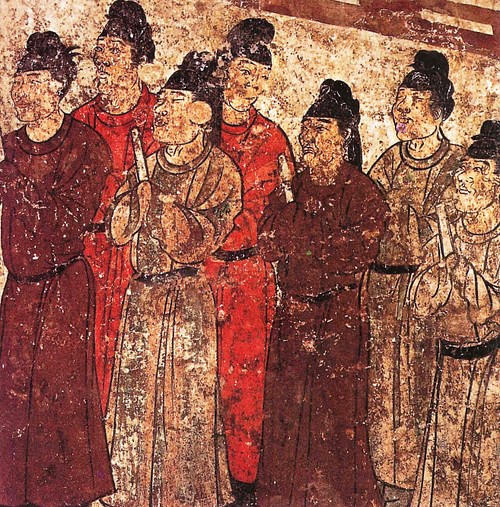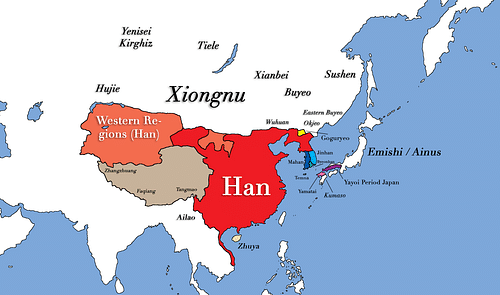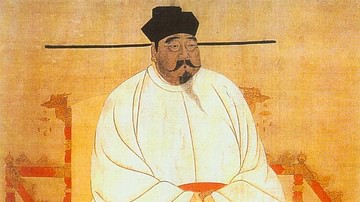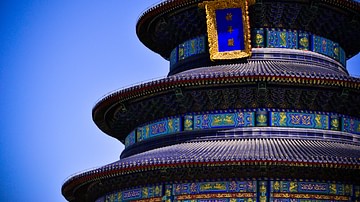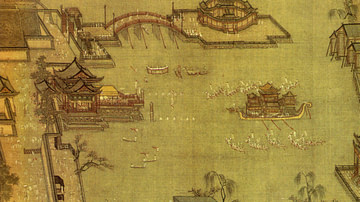Eunuchs were powerful political players in ancient Chinese government. Originating as trusted slaves in the royal household they were ambitious to use their favoured position to gain political power. Advising the emperor from within the palace and blocking the access of officials to their ruler, the eunuchs were eventually able to acquire noble titles themselves, form a bureaucracy to rival the state's and even select and remove emperors of their choosing. Their influence on government would result in the falling of dynasties and last right up to the 17th century CE.
From Slaves to Political Heavyweights
Eunuchs, or 'non-men' as they could be known, first appeared in the royal courts of ancient pre-imperial Chinese states where they were employed as servants in the inner chambers of the palace. They were more or less slaves and were usually acquired as children from border territories, especially those to the south. Castrated and brought to serve the royal household, they had no real means of altering their lives. Eunuchs were regarded as the most trustworthy of servants because they could neither seduce women of the household or father children which might form a dynasty to rival that of the sitting emperor's.
A eunuch's duties, therefore, included exclusively serving the women of the royal palace. Any other males were forbidden from staying overnight in the palace, and any person who entered unauthorised faced the death penalty. Eunuchs acted as fetchers and carriers, bodyguards, nurses, and essentially performed the roles of valets, butlers, maids, and cooks combined. Despite their privileged position, the general public's view of eunuchs was extremely negative as they were regarded as the lowest class of all servants.
In contrast to the confidence put in them by rulers, their physical deformity, disdain from the ruling class and the general stigma attached to them made eunuchs more likely to seek to exploit their privileged position and gain political influence within the court. The eunuchs would not be content with the life of a simple slave for very long. Often aligning themselves with the powerful Buddhist monasteries, they advised, spied, and intrigued in equal measure in order to acquire the top positions in the state apparatus.
Eunuchs, with their special access to the Inner Court (Neiting), where no ordinary officials were permitted, could be especially prominent when the ruler was not yet an adult and they fully exploited the possibility of not only filtering out communications from ministers to the emperor and vice versa but also appointments so that very often ministers simply could not gain an audience with their ruler. Eunuchs ingratiated themselves with the emperor and were perhaps more compliant than high-minded and more principled scholar-officials which made the emperor more likely to follow their advice.
Another point in the eunuchs' favour was that they had known their emperor perhaps for all his life and that they were the only males the ruler ever met until adulthood. In addition, the emperor knew that the eunuchs did not have a power base or loyalties outside the court, unlike the politicians.
In the Han Dynasty
Very often the eunuchs encouraged and made worse political factions, which damaged the unity of the government. Eunuchs are charged with playing a major part in the fall of the Han Dynasty (206 BCE - 220 CE). During the 2nd century CE, in particular, a succession of weak emperors were easily manipulated by the eunuchs at court. In 124 CE they even put their own child candidate on the imperial throne. They gained more imperial favour and further entrenched their position in 159 CE by helping Emperor Huan settle a family succession dispute. In gratitude, the emperor awarded a noble title to five leading eunuchs.
The eunuchs' even greater power ultimately resulted in government officials and students banding together and staging protests in 166 and 168-169 CE. The eunuchs would not be put off so lightly though and they instigated a wave of purges which saw many of those involved in the protests imprisoned and 100 executed. The luckier officials, students, and intellectuals who had spoken out against eunuch power were merely excluded from ever holding public office. In 189 CE events took an even more brutal turn. The eunuchs murdered the 'Grand General' He Jin after it was discovered he had plotted to assemble an army to himself purge the eunuchs. The general's followers exacted immediate revenge by killing all the eunuchs in the palace. With this power vacuum there then ensued a civil war for control of the empire, with the result that the Han fell and the Wei dynasty was established in 220 CE.
In the Tang Dynasty
In the troubled final years of the Tang Dynasty (618-907 CE) the eunuchs once again played a prominent role, this time in the downfall of emperors. Following rebellions in the provinces by renegade military commanders, the imperial court was eager to strengthen its position and so created a new palace army in the mid-8th century CE. The eunuchs were put in charge of this new force and soon began to create problems of their own for the emperor. Just as in previous eras, eunuchs manipulated the court, created divisions amongst the government officials, and by the 9th century CE, even began to enthrone and murder emperors. One emperor authorised an official purge of the eunuchs in 835 CE to try and claw back some power but before the plan could be executed the eunuchs wiped out over 1,000 of the conspirators and anyone else they remotely suspected of trying to usurp their power. As a shocking demonstration to any future conspirators, three chancellors along with their families were publicly executed in one of the marketplaces of the capital, Chang'an.
Famous Eunuchs
During the Song Dynasty (960-1279 CE) eunuchs were often made military commanders. One such figure was Tong Guan (1054-1126 CE) who was Emperor Huizong's most important general. He won famous victories in the north-west border regions in his youth, quashed the Fang La rebellion in Zhejiang province and continued to loyally serve his emperor into his seventies. Guan was also honoured with an official biography where it is recorded he was a painter of some talent. The biography, which appears in the Song History, displays the typical disdain and prejudice that eunuchs suffered even if they were such talented individuals as Guan:
It was his nature to be cunning and fawning. From being an attendant in the side-apartments of the palace, because he was skilled at manipulating the weighty as well as the trivial intentions of people, he was able by means of first serving in order to later command. (in Di Cosmo, 208)
Another famous eunuch was Zheng He (1371-1433 CE) who made seven voyages to the Indian Ocean for Emperor Yongle of the Ming Dynasty (1368-1644 CE). One of He's fleets was composed of 317 ships, including 62 'treasure ships' full of gifts for foreign rulers and over 30,000 men. On his various travels, He followed Arab trading routes and stopped off at such far-flung places as Vietnam, Indonesia, India, Sri Lanka, and East Africa. He then returned to China and wowed the court with his exotic captures such as giraffes, lions, and fabulous gems.
Later History
From the early 15th century CE the eunuchs set up their own mini-bureaucracy at court where they could ferret away paperwork and filter out the input of government ministers in state affairs. It even included a secret service branch which could investigate corruption or identify suspects who might plot against the status quo and imprison, beat, and torture them if necessary in the prison the eunuchs had created for that purpose. At the end of the century, this eunuch-led apparatus had grown spectacularly to 12,000 employees, making it the equal of the official state bureaucracy. By the latter stages of the Ming Dynasty (1368-1644 CE) there were some 70,000 eunuchs, and they had established almost complete domination of the imperial court. During that period four infamous dictators - Wang Zhen, Wang Zhi, Liu Jin, and Wei Zhongxian - were all eunuchs.
The power they held and the political intrigues they often stirred up resulted in the eunuchs becoming infamous, and they were especially unpopular with Confucianist scholars. Huang Zongxi, the Ming dynasty Neo-Confucianist thinker here sums up the general view of eunuchs in Chinese history: "Everyone has known for thousands of years that eunuchs are like poison and wild beasts" (in Dillon, 93).
